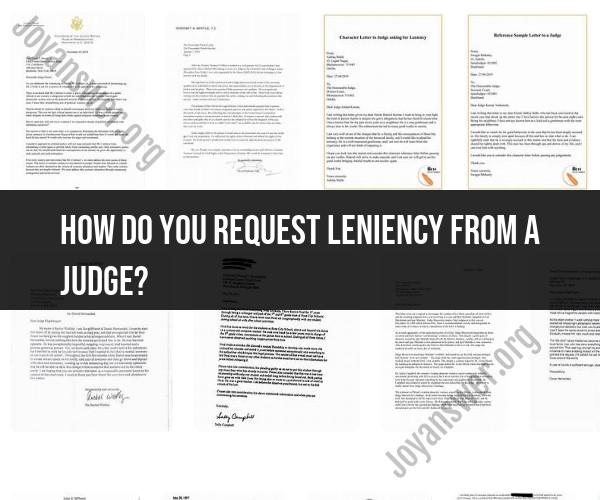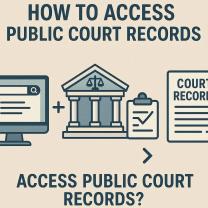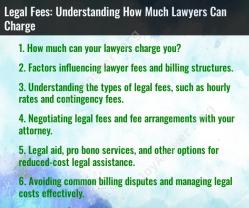How do you request leniency from a judge?
Requesting leniency from a judge is a formal and delicate process that should be approached with care and respect for the legal system. If you're facing a legal situation and believe that leniency from the judge could be beneficial, here are some tips and guidelines to follow:
1. Consult with an Attorney:
- Before making any requests for leniency, consult with an experienced attorney who can provide legal advice and guide you through the process. An attorney will understand the specifics of your case and can offer the best strategies for seeking leniency.
2. Be Respectful and Courteous:
- Maintain a respectful and courteous demeanor in all interactions with the court, including when addressing the judge. Address the judge as "Your Honor" and maintain proper courtroom etiquette.
3. Understand Your Case:
- Thoroughly understand the details of your case, including the charges against you, your criminal history (if applicable), and any relevant circumstances. Knowing your case inside and out will allow you to make a compelling argument for leniency.
4. Gather Supporting Evidence:
- Collect evidence and documentation that can support your request for leniency. This may include character references, letters of recommendation, evidence of rehabilitation efforts (if relevant), and any other documents that can demonstrate your commitment to positive change.
5. Express Remorse and Accept Responsibility:
- Take responsibility for your actions and express genuine remorse for any harm caused. Judges often look favorably upon defendants who acknowledge their mistakes and show a willingness to make amends.
6. Demonstrate Efforts at Rehabilitation:
- If your case involves criminal behavior, show that you have taken steps toward rehabilitation. This could include completion of counseling or treatment programs, community service, or engagement in educational and vocational activities.
7. Present a Persuasive Argument:
- When addressing the judge, present a clear and concise argument for leniency. Explain why you believe leniency is appropriate in your case, focusing on factors such as your remorse, efforts at rehabilitation, and your desire to be a productive member of society.
8. Highlight Mitigating Factors:
- Identify any mitigating factors that may justify leniency, such as the absence of prior criminal convictions, cooperation with law enforcement, or extenuating circumstances surrounding the offense.
9. Avoid Making Excuses:
- While it's important to present your case sympathetically, avoid making excuses or shifting blame. Taking responsibility for your actions is crucial in seeking leniency.
10. Be Prepared for Possible Outcomes:- Understand that the judge has discretion in sentencing, and the outcome may not always align with your request for leniency. Be prepared for a range of potential outcomes and discuss these with your attorney in advance.
11. Follow Legal Procedures:- Ensure that you follow all legal procedures and deadlines for making requests for leniency. Your attorney can help you navigate these processes.
12. Attend Court Hearings:- Attend all court hearings as required and as advised by your attorney. Your presence in court can demonstrate your commitment to the process and your respect for the court's decisions.
Remember that judges consider various factors when making sentencing decisions, including the nature of the offense, the defendant's criminal history, and the specific circumstances of the case. While requesting leniency is a valid approach, there are no guarantees, and the judge's decision will ultimately depend on the facts and merits of your case.
Seeking Leniency from a Judge: Strategies and Guidelines
There are a number of strategies and guidelines that you can follow when seeking leniency from a judge. Here are a few tips:
- Be honest and remorseful. The judge wants to see that you understand the seriousness of your crime and that you are truly sorry for what you did.
- Take responsibility for your actions. Don't make excuses or try to blame others for your crime.
- Explain your circumstances. The judge may be more lenient if you can explain why you committed the crime and what led you to that point.
- Highlight your positive qualities and contributions to society. The judge may be more likely to give you a lenient sentence if you can show that you are a good person who made a mistake.
- Have a plan for the future. The judge may be more lenient if you can show that you have a plan for how you will avoid committing crimes in the future.
Making a Plea for Leniency: How to Approach a Judge
When making a plea for leniency, it is important to be respectful and professional. Address the judge as "Your Honor" and speak clearly and concisely.
Here are some tips for making a plea for leniency:
- Start by apologizing for your crime and expressing your remorse.
- Explain your circumstances and why you committed the crime.
- Highlight your positive qualities and contributions to society.
- Share your plan for the future and how you will avoid committing crimes in the future.
- End by thanking the judge for their time and consideration.
Requesting Mercy: A Guide to Seeking Leniency in Court
When requesting mercy from a judge, it is important to be sincere and genuine. The judge wants to see that you truly understand the seriousness of your crime and that you are begging for forgiveness.
Here are some tips for requesting mercy from a judge:
- Be honest and upfront about your crime. Don't try to downplay your actions or make excuses.
- Express your sincere remorse for what you did. Let the judge know that you are truly sorry for the pain and suffering that you caused.
- Ask for the judge's mercy. Be specific about why you are asking for mercy and what you hope to achieve.
- End by thanking the judge for their time and consideration.
It is important to note that there is no guarantee that a judge will grant a request for leniency. However, by following the tips above, you can increase your chances of receiving a more lenient sentence.













